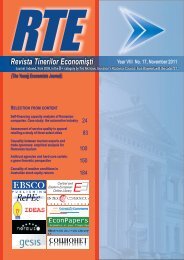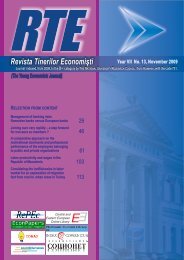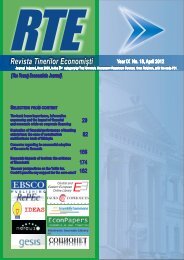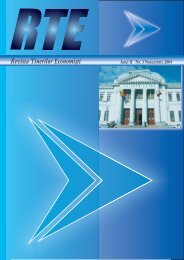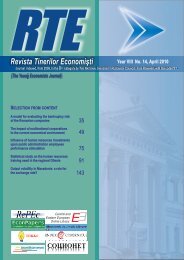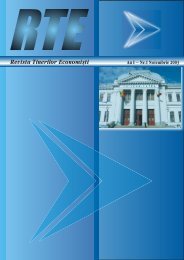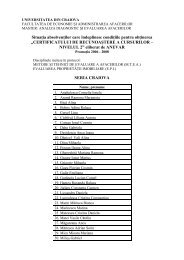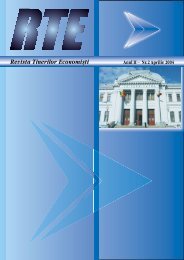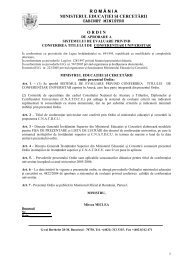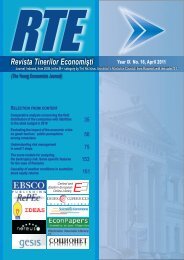Implications of change management in public administration
Implications of change management in public administration
Implications of change management in public administration
You also want an ePaper? Increase the reach of your titles
YUMPU automatically turns print PDFs into web optimized ePapers that Google loves.
75<br />
Management – Market<strong>in</strong>g - Tourism<br />
make decisions with family members, while 30% seek for advice <strong>in</strong> important decisions<br />
and 20% <strong>of</strong> Romanian respondents make <strong>in</strong>dividual decisions on less important matters.<br />
75% <strong>of</strong> the Hungarian respondents consider that the most appropriate person to<br />
decide what the shopp<strong>in</strong>g list should <strong>in</strong>clude is the one deal<strong>in</strong>g most with house<br />
hold<strong>in</strong>g, with Romanian respondents it was found that the percentage <strong>of</strong> those<br />
<strong>in</strong>dicat<strong>in</strong>g this answer possibility is lower i.e., 50%; 14% <strong>of</strong> Hungarians <strong>in</strong>terviewees<br />
consider that the person who is mandated to "manage family‟s treasury" must also deal<br />
with buy<strong>in</strong>g different products, the percentage be<strong>in</strong>g 35% <strong>in</strong> case <strong>of</strong> Romanian<br />
respondents; and f<strong>in</strong>ally 11% <strong>of</strong> Hungarian respondents consider that person that w<strong>in</strong>s<br />
the most should decide what to <strong>in</strong>clude <strong>in</strong> the basket <strong>of</strong> goods, a higher percentage, i.e.<br />
15% <strong>of</strong> Romanian respondents had the same op<strong>in</strong>ion as Hungarian respondents .<br />
To the question who is the best person to organize a trip <strong>in</strong> their view, the<br />
results were the follow<strong>in</strong>g: 21% <strong>of</strong> Hungarian respondents consider that the woman is<br />
the most appropriate person, while the percentage <strong>of</strong> Romanian respondents who say<br />
the same th<strong>in</strong>g is higher, 30%. The man is seen <strong>in</strong> the hypostasis <strong>of</strong> the trips organizer<br />
by 13% <strong>of</strong> Hungarian respondents, the percentage <strong>of</strong> Romanian respondents be<strong>in</strong>g<br />
lower, 8%. We also found that most <strong>of</strong> the respondents, both those belong<strong>in</strong>g to the<br />
Hungarian nationality, 66%, and those who are <strong>of</strong> Romanian nationality, 62% believe<br />
that family should organize together the desired trip / journey.<br />
Analyz<strong>in</strong>g data for rank<strong>in</strong>g scale where respondents had to rank the importance<br />
<strong>of</strong> people they advise with when they have to choose between various strategic<br />
alternatives, we found that both with Romanian and Hungarian respondents, the second<br />
family, mean<strong>in</strong>g that the person forms, has a more significant <strong>in</strong>fluence <strong>in</strong> choos<strong>in</strong>g the<br />
alternative strategies than the family <strong>of</strong> orig<strong>in</strong>, i.e. the first family. Both with Romanian<br />
respondents and with Hungarian ones children come third concern<strong>in</strong>g their <strong>in</strong>volvement<br />
<strong>in</strong> mak<strong>in</strong>g strategic alternatives.<br />
Regard<strong>in</strong>g the statement "The desires <strong>of</strong> children are priority <strong>in</strong> mak<strong>in</strong>g<br />
decisions" we found that <strong>in</strong> the case <strong>of</strong> Romanian respondents a very small percentage<br />
(3%) chose the alternative "totally disagreement" while <strong>in</strong> the case <strong>of</strong> Hungarian<br />
respondents the percentage is higher, 13% <strong>of</strong> respondents chose that option. The option<br />
"disagreement" was chosen by 1% <strong>of</strong> Romanian respondents and 18% for respondents<br />
belong<strong>in</strong>g to Hungarian nationality.<br />
4.2 Presentation <strong>of</strong> results obta<strong>in</strong>ed from the nonparametric tests<br />
Next we shall present the results obta<strong>in</strong>ed by apply<strong>in</strong>g various statistical tests.<br />
Follow<strong>in</strong>g the bivariate analysis, us<strong>in</strong>g the test we found that with Romanian<br />
respondents there is a connection between respondents' residence (rural or urban) and<br />
the variable that refers to the person best suited to organiz<strong>in</strong>g trips, but, <strong>in</strong> ex<strong>change</strong>,<br />
with Hungarian respondents there is no connection between the two variables<br />
2<br />
mentioned. Also the application <strong>of</strong> the test revealed that there was no l<strong>in</strong>k between<br />
Romanian and Hungarian respondents‟ <strong>in</strong>come and the variable that refers to the most<br />
appropriate person (woman or man) for organiz<strong>in</strong>g trips.<br />
We would like to highlight that before apply<strong>in</strong>g the two nonparametric tests<br />
(Kolmogorov-Smirnov and Kruskall-Wallis) the two databases have been met. When<br />
apply<strong>in</strong>g the Kolmogorov - Smirnov test we concluded that <strong>in</strong> the two groups (gender<br />
<strong>of</strong> respondents) there is no difference <strong>in</strong> the op<strong>in</strong>ion relat<strong>in</strong>g to the claim that the wife<br />
can not make a decision without the husband‟s approval. Also, there is no difference



